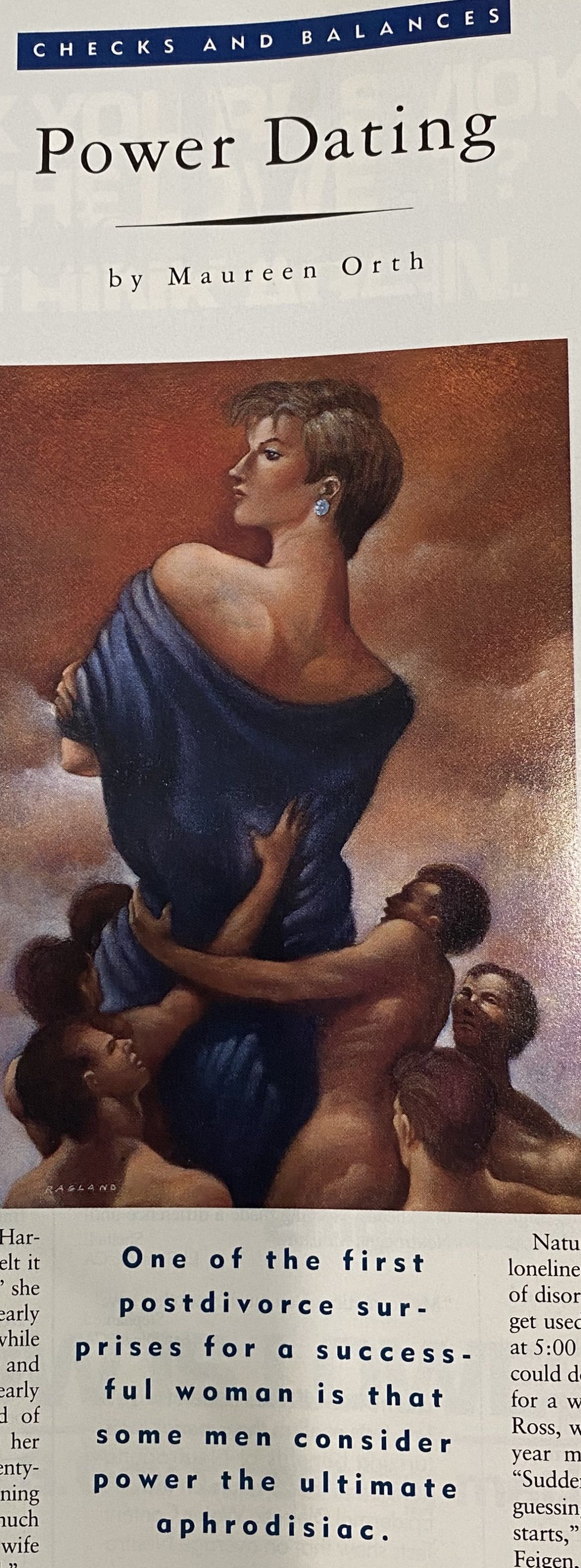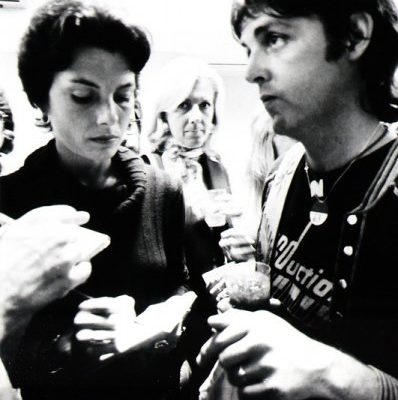Original Publication New York Woman — September, 1988
“Where do we seat the bagel maker?” That question, posed by a prominent Beverly Hills hostess the weekend before the Academy Awards, caused Cher –who ultimately won an Oscar– to be excluded from the A-list Malibu beach party. Cher’s twenty-four-year-old inamorato, once bagel maker, now a star in her rock videos, wasn’t tolerated the way a traditional mogul’s bimbo might have been. It seems not all of society, not even Malibu society, has caught up with the way a self-made woman like Cher chooses to live as a single divorcée. Obviously, there is only one Cher, but she isn’t alone in defining the rules of high-level reentry: how the powerful, financially independent woman learns to operate socially while solo. In fact, facing the dating game after years of marriage is one of the more interesting challenges posed to the female meritocracy.
The popular notion, of course, is that divorce is dreadful, a precipitator of deep depression. But often it isn’t; many women simply feel a terrific sense of relief. Susan Bird, president of S. W. Bird & Company, a successful real estate marketing firm, remembers “pretending for twenty-two years. I was like a female Rip van Winkle, asleep all that time.” In the early Sixties Bird quit Harvard Business School to get married. “I felt it was inappropriate to compete with men,” she says today. She went to law school in the early years of her marriage and practiced law while raising her two children, now thirteen and eleven, but quit when her firm mentioned early partnership – she was still so frightened of overshadowing her husband. Eventually her booming real estate career ended her twenty-two year marriage: “The power of running my own company did it. It became too much work to pretend I was just the interested wife who worked but was clearly not his equal.”
One of the first surprises for women like Bird is that there are men out there who consider power the ultimate aphrodisiac. Once divorced, Bird followed the familiar path of most newly divorced fast-track women: work, work, work – for about a year. Then, suddenly “I had more dates than I needed.” Why? “Men love to talk about my deals – they want to know how I run my company.”
A thirty-seven-year-old financial analyst who’s been separated for more than a year echoes Bird. “I remember being considered unattractive; my ambition and my career were thought to be real negatives by men. I could see it in their eyes – yecch. Now it’s wow! Since the media has started covering business, being successful gets you more capital with men. Having a high-powered woman is something they can brag about to the guys.”
A big attraction for these men, often no slouches at deal making themselves, is knowing that these women are capable of meeting the world alone. “Men are terrified they’re going to get hooked with so many financial and emotional obligations and be leveraged and mortgaged for the rest of their lives,” continues the Wall Street executive, who tends to view emotional choices in terms of market analysis. “They want to be better off, not worse off, so they look at me and say, ‘This woman is not a net drain on the system.’ ”
Naturally, there’s a down side for everyone – loneliness, anger, fear and temporary feelings of disorientation. “The first thing you have to get used to is that you’re not calling someone at 5:00 PM to let him know where you’ll be. I could do whatever I wanted; I was off balance for a while,” says interior decorator Barbara Ross, who is now single after a twenty-three year marriage that produced two children. “Suddenly you are completely alone.” Second-guessing is also common. “I go in fits and starts,” admits film producer Brenda Feigen. Feigen, the mother of a thirteen-year-old, divorced Harvard Law classmate Marc Fasteau after being married for fifteen years. “I know we’re better off apart. But sometimes I ask, ‘How did I make such a mess of things?’ There are moments when I blame myself. It’s irrational, but anytime you marry someone who’s handsome, smart, successful, you wonder.”
Divorce can also have a disastrous effect on children, which compels some women to remain in what they know to be a miserable marriage. “I was willing to go on in order to keep my family intact,” says a happily divorced artist whose husband walked out on her when the youngest of their three children was just two years old. Today the artist is glad the choice was made for her, saying that the women she knows who are most devastated by their divorces are those who defined themselves through marriage. Of one such friend the artist says, “In the area she chose to formulate her sense of self, she’s a failure.”
For self-confident women at the top of their professions, all sorts of social benefits accrue from operating in the business arena. “My job provides me with access to events and activities,” says the financial analyst. “If I see a man I like, I can say, ‘By the way, I have tickets to Irving Berlin’s birthday party. Would you like to go?’ ” She, like others, has learned that such invitations can be proffered under the guise of doing business and may or may not lead to something.
Other women, suddenly alone, are trapped in predominantly female professionals and have far fewer opportunities for meeting new men. “I am surrounded by women all day long.” complains a top editor at a fashion magazine. “So far, no one has offered to fix me up, and I may as well be in a convent. I don’t know what would happen if one of my women friends suddenly fell in love. Weekends can be very long when you’re single.”
Meeting someone new and learning how to cope with dating is a huge first step for many women, no matter how confident they are in business. In the age of AIDS, seeing former boyfriends and longtime good friends getting fixed up by others – the old-fashioned blind date – are the most common ways high-level divorcées get started. The cardinal rule, according to many, is to be game – no matter what. Bernice Carton, a travel writer who came out of a forty-two-year marriage extremely well off, says, “I couldn’t go through with it; I broke the rule. My first blind date was with a surgeon who walked in, looked at my old apartment and said ‘Jeez, I bet you could get two mil for this place.’ ” When Carton suggested having dinner at a certain restaurant, he said “I ate there last night; I threw up all night.” She feigned illness, and he left.
That, say many women-about-town, is definitely the wrong way to go. “Approach it like a field trip,” advises one woman. The financial analyst says, “There are so many guys out there my girlfriends would reject saying, ‘Oooh, I’d never go out with him,’ but I’m really game. I’d think of really neat things to do, like how I once rented a Ferrari and made reservations in Saratoga and invited some guy I was having lunch with to come along, and we ended up having an incredible weekend, all because I was a sport. Women have to learn that money permits you to do all these crazy things, and in business you learn that if you’re rejected you don’t take it personally.” Her best advice? “Develop a farm system. I keep a whole bunch of them going at the same time. If there was only one at a time, I’d kill him.”
What many of these women seem to be aiming for is the same degree of control outside the office as inside. Those who appear to be having the most fun take it for granted that to get what they want, it’s up to them to make the first move– even if that means reverting to behavior once considered strictly masculine. “I picked up a wonderful man on the street while hailing a taxi once,” recalls Barbara Ross. “I liked this person immediately and made sure I wasn’t going to lose him.” She didn’t. “We’re still good friends,” she says.
In fact, being assertive regarding the most mundane details is almost a game to these ambitious players, and how men handle the niceties can determine the outcome of a relationship. “I want to be able to call the waiter over for more water without asking my date to ask,” says Brenda Feigen. “It’s a test of the people I’m around if they can take it.”
“After twenty-two years,” says Susan Bird, “I thought, I’ll just say whatever I want so that people who are attracted to me know what they are getting.” How do they like it? “Some are intimidated. I can read it in their conversation.” At the same time, Bird says she’s found a wonderful man she’s mad for, a peer whose business advice she takes “very seriously.”
Interestingly, two phenomena seem to be present at once. The Wall Street whiz reports that men have proposed marriage to her in purely business terms, “as if I was a mail-order bride. They’ll say, ‘Look, with this AIDS thing… I make X and you make a lot of money. I’m a good investment. I can’t do it all by myself, and you can more than carry your own weight….’ ” Love never enters into it.
Yet powerful career women who have been divorced some years also claim that it is not uncommon for men who were initially attracted to a strong, successful woman to have second thoughts. “Independence is what they think they want,” says Sandra Colony, a director of corporate communications at Manhattan Cable Television who’s been divorced eight years. “But when you’re involved in an intimate relationship over time, your independence seems to be the very thing they want to change.” Colony says that some men use their sense of responsibility as a form of control. “Say I’m traveling and I want to take the day off by myself – suddenly I have to report in because he feels responsible for me. But me being independent means being able to be alone.”
That may be, but isn’t part of the explanation that many women who go through high level reentry fear intimacy?
One woman with an important government job who’s been divorced ten years states flatly that the only choices available are less-demanding younger men, working-class men who have no idea of what she really does or married men. Married men are safe, she says, because so many issues prevalent in other relationships aren’t concerns at all when one person isn’t free to pursue the relationship to its logical conclusion. “You can see him on and off – it’s not an encroachment.”
Encroachment. An interesting word choice. Part of the attraction for a successful broker in her late thirties who is currently infatuated with a thirty-year-old graduate student is that he is not a peer. “I thought I’d be dating fifty-five-year-old CEOs, but I find they bore me. These old guys want to be admired for the stuff I’m around all day. I’ve just finished a deal myself, so I can’t get excited about theirs.” Instead, she’d rather come home to the traditional blandishments powerful men are used to when dating undemanding younger women: “Someone who doesn’t expect me to do everything for him. He finds my stuff interesting and he doesn’t feel competition with someone who’s very, very successful.”While freedom from competition may be important, it is freedom to create relationships on their own terms that many fast-track New York women prize above all. “I can pick and choose,” says one, “I’m not scared to be by myself. I don’t have to be in a frantic way. I make my own money, so I don’t have to be impressed with a man’s money and power. I can’t tell you how liberating that is. You can really pick people for the right reasons. I feel really calm. I’m going to do it right or not at all.” But whether or not they’ll end up with it all is still a burning question.





No Comments